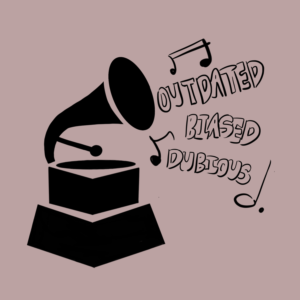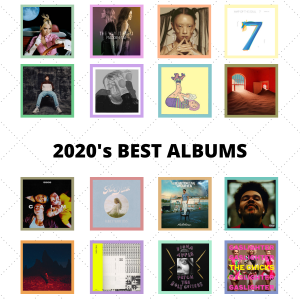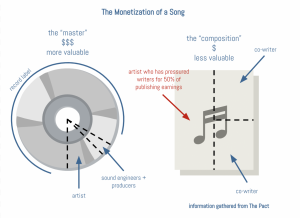Grammys performances electrify, but show struggles to retain lost popularity
The 64th Grammy Awards featured dynamic performances and touching tributes in an attempt to reassert its importance within the public sphere.
April 24, 2022
High expectations fell upon the 64th annual Grammy Awards. The ceremony was held Apr. 2 after a two-month postponement due to COVID-19 concerns. With viewership declining sharply at the beginning of the pandemic in 2020, combined with criticism of the Recording Academy, showrunners had to walk a fine line to attract viewers without causing controversy. Nevertheless, the performances outdid themselves with engaging visuals and live bands.
Silk Sonic began the show with a bang, playing their appropriately-named song “777” as they lit up the MGM Grand stage in Las Vegas. While it energized the audience, it was surprising the duo of Anderson .Paak and Bruno Mars chose not to perform one of their better known songs. Nevertheless, some of the show’s funniest moments included the dynamic duo swaggering to the stage as they took home all four of their nominated awards—a “clean sweep,” as .Paak called it (while donning a great 60s-esque wig).
Veteran performers like Lenny Kravitz and Nas (not to be confused with Lil Nas X) captivated the stage, while the show also highlighted comparatively lesser-known artists. For example, Justin Bieber’s attempt at transforming “Peaches” into a piano ballad fell flat, but contemporary R&B artists Daniel Caesar and Giveon revitalized the performance. Additionally, reggaeton superstar J Balvin’s uptempo choreographed set complemented the vocals of Argentine YouTuber-turned-rising star María Becerra.
Not quite soul and not quite jazz, the genre-blending Jon Batiste was the biggest winner of the night, taking home five of his 11 awards. Dark horse candidate “Heaux Tales,” one of the most enjoyable and refreshing R&B albums of the year, won Jazmine Sullivan her first two trophies. Others weren’t as lucky, like Lil Nas X, who ended up going 0-5. However, he performed his hits “Montero (Call Me By Your Name)” and “Industry Baby” with bravado—after all, as he rapped in “Industry Baby,” he already has a “couple Grammys on him.”
Olivia Rodrigo won three well-deserved Grammys at her debut Recording Academy appearance, including the coveted Record of the Year for her single “Drivers License.” Another Gen Z powerhouse, Billie Eilish, poured her heart out in her performance of “Happier Than Ever” on a raining stage while donning a Taylor Hawkins shirt. Hawkins, the drummer of rock band Foo Fighters, passed on Mar. 25.
Hawkins and other musicians who passed since the previous year’s Grammys were honored during the surprisingly heartwarming In Memoriam section, which historically has been a toss-up between touching or superficial. Cynthia Erivo, Leslie Odom Jr., Ben Platt and Rachel Zegler sang a medley of Stephen Sondheim songs—the lauded composer who died in Nov. 2021—and brought the most impressive vocal performances of the night.
Also notable was the poignant tribute to war-torn Ukraine, with President Volodymyr Zelenskyy himself appearing via video message, urging artists to “Fill the silence with your music.” John Legend performed his song “FREE” while highlighting three Ukrainian women: singer Mika Newton, poet Lyuba Yakimchuk and musician Siuzanna Iglidan, who played the bandura, a traditional Ukrainian string instrument. The tribute was tastefully done and portrayed the tragedy with humanity and hope.
BTS performed for the second year in a row, delivering an engaging spy-themed performance of “Butter” with their characteristically precise choreography and even a cameo from Olivia Rodrigo. However, after losing the Grammy for “Best Pop Duo/Group Performance” yet again, the record-breaking group is still 0-2. Although “Butter” and last year’s contender for the same award, “Dynamite,” don’t have the same lyrical caliber as their other hits (BTS wasn’t majorly involved in the songwriting of those songs, which are fully in English), their Grammy misses highlight the Recording Academy’s ongoing struggle to integrate popular foreign language music into the show.
The exclusion of these two Billboard No. 1s further highlights the continual snubbing of non-white and non-English speaking stars. The Grammys have been accused of shoehorning Black and Latinx artists into vague “rap” and “urban” categories, while the existence of a separate Latin Grammys show speaks to the segregation within the awards. However, this year’s main ceremony was the first to have an inclusion rider, and Academy executives have made some steps in a positive direction.
In addition to a commitment towards diversity, the Recording Academy also pledged to acknowledge its invaluable industry workers. At this year’s Grammys, behind-the-scenes faces were given screen time by announcing artists for whom they’ve worked with, but this gave the impression that their jobs were unimportant compared to those of famous musicians. The efforts seemed especially lackluster considering a “Grammy-sponsored pledge from 2019 to hire more female producers and engineers has had almost no impact,” the New York Times reported.
Due to this recent flurry of criticism, the Recording Academy seemed to take every possible precaution to avoid scandal. For example, Kanye West, who was up for five nominations, was barred from performing at this year’s show due to his troubling online posts. Country singer Morgan Wallen failed to gain nominations for his chart-topping album “Dangerous,” following a year of exclusion from awards shows and radio play due to his use of a racial slur in 2021. Even returning host Trevor Noah’s jokes were uncharacteristically dull (though he and Questlove both had quips regarding the infamous slap from the previous week’s Oscars).
Though the Grammy Awards seemed to have lost a bit of their glamor, with many nominees skipping the red carpet and even the ceremony itself (Kendrick Lamar, Taylor Swift), it appeared that receiving an award from the Recording Academy has not gone unappreciated by all artists. Doja Cat, for example, who declared in March that she was “quitting” her music career, accepted the Best Pop Duo/Group Performance award for “Kiss Me More” alongside SZA with tears in her eyes.
Carried by the outstanding live performances, the Grammys were in no way a failure. They can and should remain so that musicians can be honored by esteemed members of their field, and so stunning performances can continue to delight viewers. However, for the awards show to regain its viewership and credibility, the Academy should continue to place diverse voices into positions of power and constantly work to increase accessibility and transparency within the music industry. Then, hopefully, the Grammy Awards can convincingly regain its title as “music’s biggest night.”





